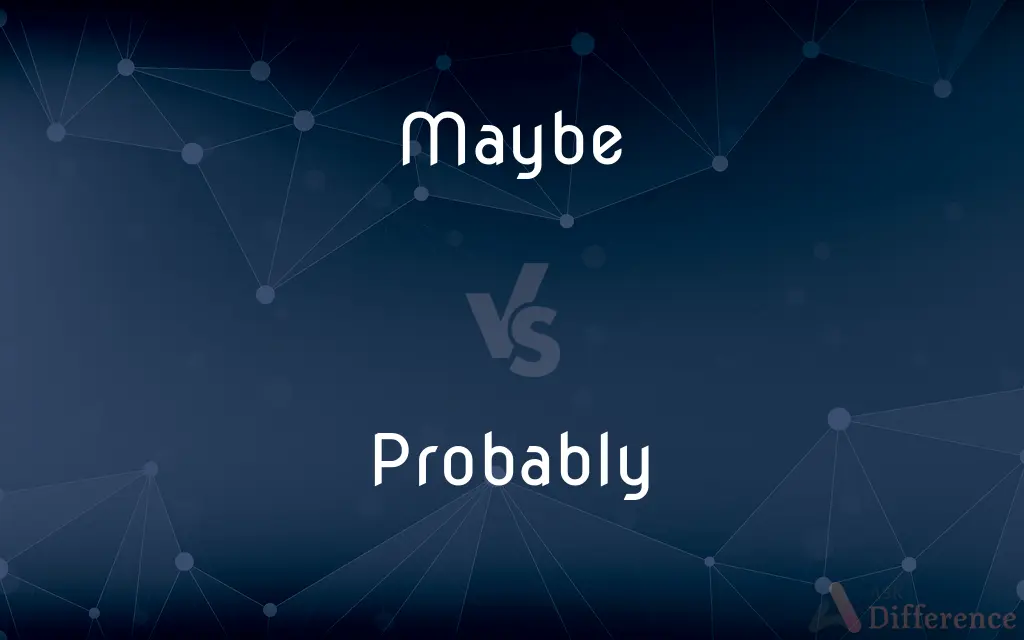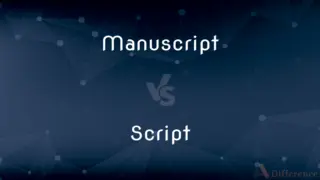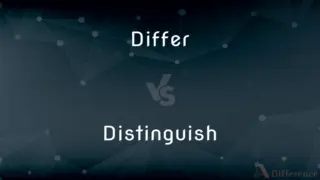Maybe vs. Probably — What's the Difference?
By Maham Liaqat & Fiza Rafique — Updated on March 9, 2024
"Maybe" suggests uncertainty or possibility without leaning towards a specific outcome, while "probably" indicates a higher likelihood or confidence in a particular outcome occurring.

Difference Between Maybe and Probably
Table of Contents
ADVERTISEMENT
Key Differences
"Maybe" is used to express uncertainty or indecision about a situation, implying that an outcome is possible but not certain. It conveys a sense of ambiguity without committing to a definite answer. On the other hand, "probably" suggests that, based on the available evidence or logical reasoning, there is a higher chance of a certain outcome happening, although it is still not guaranteed.
When someone uses "maybe," they are keeping options open and not leaning towards any particular side or decision. It's a non-committal response that doesn't convey any estimate of how likely something is to happen. In contrast, "probably" is often used when someone believes that something is more likely than not to occur, showing a degree of confidence in the outcome.
The choice between "maybe" and "probably" can significantly affect the tone of a conversation. "Maybe" can indicate hesitance or a desire to delay making a decision, while "probably" can convey optimism or a tentative assurance, influencing how others perceive the speaker's intentions or beliefs.
In terms of communication, "maybe" is useful when you want to avoid making promises or when you need more time to decide. "Probably," however, is more appropriate when you want to reassure someone or suggest that you are leaning towards a positive response, but without making a firm commitment.
The interpretation of "maybe" and "probably" can also vary depending on the speaker's tone, context, and additional verbal or non-verbal cues. For example, a "maybe" said with enthusiasm can sometimes feel more affirmative, just as a "probably" said with hesitation might seem less certain.
ADVERTISEMENT
Comparison Chart
Indicative of
Uncertainty or possibility
High likelihood or confidence
Suggests
An open or undecided outcome
A leaning towards a specific outcome
Conveys
Ambiguity, non-commitment
Optimism, tentative assurance
Usage context
To avoid commitment or when undecided
When confident but not certain
Tone
Can be hesitant or neutral
Generally more optimistic or assured
Compare with Definitions
Maybe
Possibly but not certainly.
Maybe we'll go out for dinner tonight.
Probably
Very likely such as almost certainly.
It will probably rain this afternoon.
Maybe
Used to express uncertainty.
I haven't decided yet, maybe I'll join you later.
Probably
Implies a greater likelihood than not.
You're probably right about that.
Maybe
Can be used to soften a refusal.
Maybe next time, I'm busy right now.
Probably
Used to indicate a high degree of confidence.
I'll probably finish the project by tomorrow.
Maybe
Indicates indecision.
Maybe I should start a new hobby.
Probably
Often used to reassure.
Don't worry, we'll probably get there on time.
Maybe
Suggests a lack of commitment.
Maybe I'll consider your offer.
Probably
Can suggest tentative plans.
We'll probably go hiking this weekend.
Maybe
Perhaps; possibly
Maybe I won't go back
He was standing maybe 20 or 30 feet away
Probably
Most likely; presumably.
Maybe
A mere possibility or probability
No ifs, buts, or maybes
Probably
In all likelihood.
Maybe
Used to indicate uncertainty or possibility
We should maybe take a different route. Maybe it won't rain.
Probably
In a probable manner; in likelihood.
Distinguish between what may possibly and what will probably be done.
Maybe
An uncertainty
There are so many maybes involved in playing the stock market.
Probably
With considerable certainty; without much doubt;
He is probably out of the country
In all likelihood we are headed for war
Maybe
An uncertain reply
It's better to receive a fast and honest no than a drawn-out maybe.
Probably
Easy to believe on the basis of available evidence;
He talked plausibly before the committee
He will probably win the election
Maybe
Modifies a verb, indicating a lack of certainty: it may be (that)...
Maybe I was imagining it, but I could swear that the dog understood what I was saying.
Maybe
Perhaps that is true expressing no commitment to a decision or a neutral viewpoint to a statement.
Maybe
Certainly.
Maybe not the best idea.
Maybe
Possible; uncertain.
Maybe
(informal) Something that is possibly true.
Maybe
(informal) An answer that shows neither agreement nor disagreement.
The results of the poll were inconclusive. We got two yeses, three nos, and four maybes.
Maybe
(informal) A future event that may or may not happen.
About your raise: it's a big maybe.
Maybe
Perhaps; possibly; peradventure.
Maybe the amorous count solicits her.
In a liberal and, maybe, somewhat reckless way.
Maybe
Possible; probable, but not sure.
Then add those maybe years thou hast to live.
Maybe
Possibility; uncertainty.
What they offer is mere maybe and shift.
Maybe
By chance;
Perhaps she will call tomorrow
We may possibly run into them at the concert
It may peradventure be thought that there never was such a time
Common Curiosities
Can "maybe" and "probably" be used interchangeably?
They are not generally interchangeable because "maybe" expresses uncertainty, while "probably" indicates a higher likelihood of something happening.
Does "probably" imply a promise?
"Probably" does not imply a promise; it suggests likelihood but does not guarantee an outcome.
How can I make "maybe" sound more positive?
Adding enthusiasm or positive context can make "maybe" sound more affirmative.
When should I use "maybe" instead of "probably"?
Use "maybe" when you are unsure about a decision or outcome and want to express uncertainty.
What does "maybe" mean?
"Maybe" means that something is possible but not certain, indicating uncertainty or indecision.
What does "probably" mean?
"Probably" suggests that something is very likely or almost certain to happen, indicating a high degree of confidence.
Is "probably" a definite yes?
No, "probably" is not a definite yes. It indicates that something is likely to happen, but it's not guaranteed.
Can "maybe" be used to politely decline an invitation?
Yes, "maybe" can be used to softly decline an invitation or to defer a decision.
Can "probably" be used to make plans?
Yes, "probably" can be used when making tentative plans, indicating a strong intention unless something changes.
How does tone affect the meaning of "maybe" and "probably"?
Tone can significantly influence how "maybe" and "probably" are interpreted, with enthusiasm or hesitance altering their perceived certainty.
How do cultural differences affect the interpretation of "maybe" and "probably"?
Cultural nuances can influence how these terms are perceived, with some cultures interpreting them as more affirmative or negative than others.
Is it better to avoid "maybe" and "probably" in important decisions?
In important decisions, it's often better to be clear and decisive, using "maybe" and "probably" sparingly to avoid ambiguity.
Is "probably" more optimistic than "maybe"?
Yes, "probably" is often more optimistic because it suggests that something is more likely to occur.
How can I make a decision when stuck between "maybe" and "probably"?
Consider the consequences, seek advice, or gather more information to move from uncertainty to a more confident stance.
Is it rude to use "maybe" in a professional setting?
Not necessarily, but it's important to clarify your intentions or follow up with more information to avoid miscommunication.
Share Your Discovery

Previous Comparison
Manuscript vs. Script
Next Comparison
Differ vs. DistinguishAuthor Spotlight
Written by
Maham LiaqatCo-written by
Fiza RafiqueFiza Rafique is a skilled content writer at AskDifference.com, where she meticulously refines and enhances written pieces. Drawing from her vast editorial expertise, Fiza ensures clarity, accuracy, and precision in every article. Passionate about language, she continually seeks to elevate the quality of content for readers worldwide.
















































